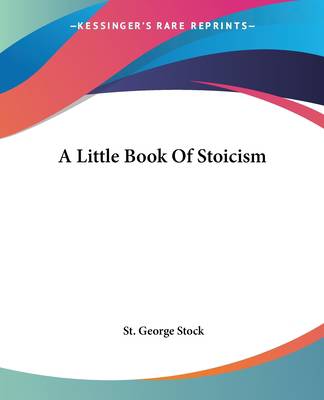
- Afhalen na 1 uur in een winkel met voorraad
- Gratis thuislevering in België vanaf € 30
- Ruim aanbod met 7 miljoen producten
- Afhalen na 1 uur in een winkel met voorraad
- Gratis thuislevering in België vanaf € 30
- Ruim aanbod met 7 miljoen producten
Zoeken
Omschrijving
""A Little Book of Stoicism"" by St. George Stock is a concise guide to the philosophy of Stoicism, which originated in ancient Greece and has been practiced for centuries. The book provides an introduction to the key principles of Stoicism, including the importance of reason, self-control, and virtue. It also explores how Stoicism can be applied to everyday life, offering practical advice on how to deal with challenges and overcome obstacles. The book features quotes and insights from famous Stoic philosophers such as Epictetus, Seneca, and Marcus Aurelius, as well as modern interpretations of Stoicism. With its straightforward language and accessible style, ""A Little Book of Stoicism"" is a valuable resource for anyone interested in learning more about this influential philosophy.Logic as a whole being divided into rhetoric and dialectic: rhetoric was defined to be the knowledge of how to speak well in expository discourses and dialectic as the knowledge of how to argue rightly in matters of question and answer. Both rhetoric and dialectic were spoken of by the Stoics as virtues for they divided virtue in its most generic sense in the same way as they divided philosophy into physical, ethical, and logical. Rhetoric and dialectic were thus the two species of logical virtue. Zeno expressed their difference by comparing rhetoric to the palm and dialectic to the fist.This scarce antiquarian book is a facsimile reprint of the old original and may contain some imperfections such as library marks and notations. Because we believe this work is culturally important, we have made it available as part of our commitment for protecting, preserving, and promoting the world's literature in affordable, high quality, modern editions, that are true to their original work.
Specificaties
Betrokkenen
- Auteur(s):
- Uitgeverij:
Inhoud
- Aantal bladzijden:
- 48
- Taal:
- Engels
Eigenschappen
- Productcode (EAN):
- 9781419102080
- Verschijningsdatum:
- 17/06/2004
- Uitvoering:
- Paperback
- Formaat:
- Trade paperback (VS)
- Afmetingen:
- 190 mm x 235 mm
- Gewicht:
- 99 g

Alleen bij Standaard Boekhandel
+ 51 punten op je klantenkaart van Standaard Boekhandel
Beoordelingen
We publiceren alleen reviews die voldoen aan de voorwaarden voor reviews. Bekijk onze voorwaarden voor reviews.











